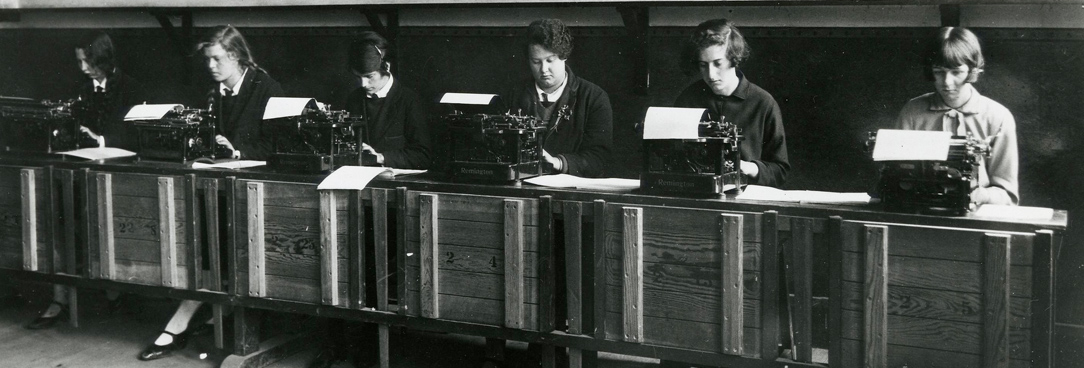Author: Lina Leibovich
Law graduate Lina is being mentored by Hazel Edwards as part of the 'Complete Your Book in a Year' course that started at the Victorian Archives Centre. She is writing a family memoir.
Sit down at laptop. Make sure it is on. Plugged in. Stare at blank page. Get up make coffee. Mental note to declutter the kitchen. Repeat.
Pre COVID-19 life presented its own procrastination challenges that we came to accept and live with. We had become accustomed to our ability, and sometimes inability to meet our deadlines. Then COVID-19 hit and changed everything. It changed the way people work, challenged the whole existence of the ‘workplace’ and ultimately productivity. The idea of working from home is great in theory, and sure it can work for some people. However for many of us, working from home meant that our life roles morphed into one big blur. The roles may have included, and not been limited to: father, mother, brother, sister, family member, employee, friend, cleaner, chef, entertainer and CEO. No longer could you define 9 to 5 role. No longer could you separate one role from another. It had become increasingly difficult to sit and focus.
Those workers from home, especially the writers of today face various challenges that need to be realised and accepted in order to find the right strategies to combat these obstacles and move forward. Here are three of the most significant challenges facing writers, in particular, in this confusing time:
1. Lack of structure
The idea of having to leave the house early in the morning to either beat the morning traffic, make the early train, get to the gym and arrive in the office with a coffee in hand now can seem a lifetime ago. Looking back, knowing that hindsight is 20/20, those busy stressful mornings become appealing again. Most of us would do pretty much anything to have those days back.
The structure of pre-COVID days now looks ideological. The world has been forced out of the workplace and into homes all while expecting the same or even higher productivity. We had to create our ‘home office’ alongside our children’s ‘home schooling’, and everyone else’s ‘study, office, gym’ etc.
Having to make it all work at home took away structure from work, from life, from being able to write. Looking back now, structured life made sure we knew, more or less, the method to our own productivity. Knowing how to procrastinate, and how to just get writing anything to get into the writing flow.
It turns out that we need structure to be good at our roles in life, to be productive human beings and to create a fulfilled balance in our lives.
2. Motivation
The pre-COVID life was busy, there was always somewhere you would need to be or something you would be missing out on. Fear of missing out became an actual condition, FOMO, yet it gave purpose to be up early, get dressed and be social. As soon as there was nowhere to be, nowhere to go or noone to meet, the motivation to even get dressed fell to an all time low.
As the days turned into weeks, then blurred into months, dress codes drastically changed. Zoom meetings are now the normal, as is staying in pyjama pants all day (no one can see below the waist on a video call after all). Learning the art to being lazy, getting dressed was accompanied by a lack of motivation for working and writing.
And now is the time for a renewed energy to create and write. Walking or running can help clear the mind and focus on the world in front of us. What we were too busy before to notice, now we are blessed with the time to see. This clarity is invigorating, and just the kick that our motivation needed.
3. Space
Once home became the centre of life, the space that once created a separation between home and work was immediately extinct. Those of us who need space and time to be able to get into the productive flow of writing suddenly had none. Space became a novelty, a luxury.
Creating an office space at home, along with everyone else in the household, is a constant juggle. From negotiating who gets which desk, to keeping the kitchen table tidy, the clutter at home has come to mimic the clutter in our brains from trying to dissect what is happening in the world.
No matter how small, a space that feels most comfortable should become the ‘working space’. Keeping this space neat or messy is an important characteristic of the most productive ethos of pre-COVID life. Everyone will be different, everyone will have their own ‘write’ of way.
Life is not going back to pre-COVID anytime soon, and to face the real harsh truth, it may never go back to the way it was. This makes life now so valuable as we have the opportunity to re-evaluate how we work, why we work, and what we want to work on. Structure, space and motivation can all be tamed, therefore we must let our spirit continue to run free and create important stories to escape into, find solace in, and those important ones that should never be forgotten.
Material in the Public Record Office Victoria archival collection contains words and descriptions that reflect attitudes and government policies at different times which may be insensitive and upsetting
Aboriginal and Torres Strait Islander Peoples should be aware the collection and website may contain images, voices and names of deceased persons.
PROV provides advice to researchers wishing to access, publish or re-use records about Aboriginal Peoples
